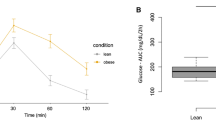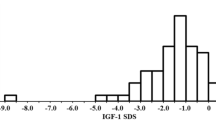Abstract
OBJECTIVES: We investigated the effect of obesity on the serum levels of total and free IGF-1 and their relationship to the circulating levels of insulin and IGF binding proteins (IGFBPs) in age and sex-matched groups. SUBJECTS: The study included 43 obese subjects (ideal body weight; IBW>120%) and 45 controls (IBW<100%). All of the subjects were male. MEASUREMENT: Total IGF-1, free IGF-1, IGFBP-1, IGFBP-2, IGFBP-3, and insulin were measured in obese subjects and normal control subjects. RESULTS: No significant differences in the circulating levels of total and IGFBP-3 were observed between the obese and control groups. In contrast to total IGF-1, free IGF-1 in obese subjects was significantly increased compared to normal controls (P<0.05). Serum total and free IGF-1 were inversely correlated with age (r=−0.42, P=0.001, and −0.44, P=0.001). Fasting serum insulin concentrations were elevated in all the obese subjects (P<0.05) and positively correlated with IBW (r=0.57, P=0.001). The levels of serum GH and IGFBP-1 were suppressed in all the obese subjects (P<0.05). IGFBP-1 was inversely correlated with IBW (r=−0.51, P=0.001) and serum insulin concentrations (r=minus;0.48, P=0.001). The IGFBP-2 concentrations were also suppressed in obese subjects and inversely related to free IGF-1 (r=−0.48, P=0.001). Using multiple linear regression analysis, total IGF-1 and insulin concentrations were positively correlated (r=0.58, P=0.001) and free IGF-1 and IGFBP-1 concentrations were negatively correlated (r=−0.57, P=0.001). CONCLUSION: We confirmed that total IGF-1 and IGFBP-3 concentrations were not significantly different between the obese and control groups, despite GH hyposecretion in obesity. We also found that free IGF-1 concentrations were higher in obese subjects than in normal controls. It seems likely that overnutrition and chronic hyperinsulinaemia in obesity may alter this regulated growth response by insulin stimulation of IGF-1 production and suppression of hepatic IGFBP-1 and IGFBP-2 production, which may inhibit IGF-1 bioactivity.
This is a preview of subscription content, access via your institution
Access options
Subscribe to this journal
Receive 12 print issues and online access
$259.00 per year
only $21.58 per issue
Buy this article
- Purchase on Springer Link
- Instant access to full article PDF
Prices may be subject to local taxes which are calculated during checkout
Similar content being viewed by others
Author information
Authors and Affiliations
Rights and permissions
About this article
Cite this article
Nam, S., Lee, E., Kim, K. et al. Effect of obesity on total and free insulin-like growth factor (IGF)-1, and their relationship to IGF-binding protein (BP)-1, IGFBP-2, IGFBP-3, insulin, and growth hormone. Int J Obes 21, 355–359 (1997). https://doi.org/10.1038/sj.ijo.0800412
Received:
Revised:
Accepted:
Issue Date:
DOI: https://doi.org/10.1038/sj.ijo.0800412
Keywords
This article is cited by
-
Insulin and IGF-1 have both overlapping and distinct effects on CD4+ T cell mitochondria, metabolism, and function
Scientific Reports (2024)
-
Adipose tissue macrophages: implications for obesity-associated cancer
Military Medical Research (2023)
-
Obesity: a perfect storm for carcinogenesis
Cancer and Metastasis Reviews (2022)
-
Growth Hormone and Counterregulation in the Pathogenesis of Diabetes
Current Diabetes Reports (2022)
-
Cancer and diabetes: the interlinking metabolic pathways and repurposing actions of antidiabetic drugs
Cancer Cell International (2021)



